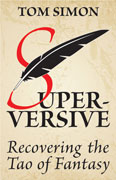Now I deny that anything is, or can be, uninteresting.
—G. K. Chesterton, ‘What I Found in My Pocket’
In the noble little essay from which this noble little sentence is taken, Chesterton waxed lyrical about the many things that he found in his pockets: his pocket-knife, the type and symbol of all the swords of feudalism and all the factories of industrialism; a piece of chalk, representing all the visual arts; a box of matches, standing for Fire, man’s oldest and most dangerous servant; and so on and on. (The one thing he did not find there was the magical talisman he was looking for; and that, though he must have felt it too obvious to remark upon explicitly, is the type and symbol of the fairytale. There is always something that the hero will not find in his pockets, so that he must go forth a-questing.)
Now, I heartily agree that every one of these things is very interesting indeed, and all for the same reason: they are things that you can do something with. But since his time, in the advance of all our arts and the decay of all our sciences, we have greatly multiplied another class of things that are, in the main, very uninteresting. You can do nothing with these things; you can only do things to them. And when the best that you can do to a thing is to ignore it, you have reached the very nirvana of uninterestingness. [Read more…]








Recent Comments